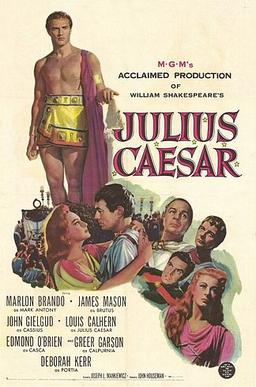
William Shakespeare's Julius Caesar
Julius Caesar (billed on-screen as William Shakespeare's Julius Caesar) is a 1953 American film adaptation of the Shakespearean play, directed by Joseph L. Mankiewicz and produced by John Houseman for Metro-Goldwyn-Mayer. It stars Marlon Brando as Mark Antony, James Mason as Brutus, Louis Calhern as Caesar, John Gielgud as Cassius, Edmond O'Brien as Casca, Greer Garson as Calpurnia, and Deborah Kerr as Portia.
Julius Caesar
Joseph L. Mankiewicz
Julius Caesar
1599 play
by William Shakespeare
- June 3, 1953
121 minutes
United States
English
$2 million[1]
$3.9 million
The film opened to positive reviews, and was nominated in five categories at the 26th Academy Awards (including Best Picture and Best Actor for Brando), winning Best Art Direction - Black-and-White. Brando and Gielgud both won BAFTA Awards, Brando for Best Foreign Actor and Gielgud for Best British Actor.
Production[edit]
Producer John Houseman says the film was made because Laurence Olivier's 1944 production of Henry V had been a success. MGM's head of production Dore Schary offered the project to Houseman, who said he wanted Joseph L. Mankiewicz to direct because he thought he and William Wyler were "probably the two best dialogue directors in the business" and that Mankiewicz was "younger and more flexible."[2]
Houseman did not want to use an all-British cast. "I'd done a lot of Shakespeare in America," he said. "If it was going to be cast all-English, it should be an English picture, made in England and we might as well forget about it."[2]
Houseman says MGM wanted to make the film in color but he and Mankiewicz refused, "partly because we wanted people to relate to the newsreels, to the Fascist movements in Europe, which were still relevant" and also because they would be "using a lot of the Quo Vadis sets, and it seemed idiotic to invite comparison with Quo Vadis."[2]
Though Houseman originally intended to shoot the film in Italy, production ultimately took place in Los Angeles instead. Many of the sets and costumes were repurposed from Quo Vadis (1951), with several setpieces deconstructed, flown from Rome to California, and rebuilt on MGM's Culver City studio backlot.
Houseman says they "decided to do it as a small production, not a spectacle; to do it for what it really is—the drama of a political power play."[2]
Release[edit]
The film premiered at the Booth Theatre in New York City on June 3, 1953.[10][11]
Reception[edit]
Critical response[edit]
The film received highly favorable reviews.[12] Bosley Crowther of The New York Times called it "a stirring and memorable film,"[13] while Variety wrote: "A triumphant achievement in film-making, it will be rated one of the great pictures of Hollywood."[14] Harrison's Reports raved, "Excellent! Sumptuously produced, expertly directed and brilliantly acted, 'Julius Caesar' is an artistic triumph that ranks with the best of the Shakespearean plays that have been put on film."[15] John McCarten of The New Yorker called the film "a very chilly exercise" and opined that Brando "plainly shows he needs a bit of speech training before he can graduate into an acting league where the spoken word is a trifle more significant than the flexed biceps and the fixed eye," but praised Mason and Gielgud as "a pleasure to watch and listen to."[16] The Monthly Film Bulletin called it "an excellent film, excellent cinema, excellent entertainment, and pretty respectable art."[17]
In the second volume of his book The Story of Cinema, author David Shipman pointed to Gielgud "negotiating the verse as in no other Shakespeare film to date except Olivier's".[18] On Rotten Tomatoes the film has an approval rating of 96% based on reviews from 25 critics.[19]
The film is recognized by American Film Institute in these lists:
Awards and nominations[edit]
The film won the Academy Award for Best Art Direction (Cedric Gibbons, Edward Carfagno, Edwin B. Willis, Hugh Hunt), and was nominated for Best Actor in a Leading Role (Marlon Brando), Best Cinematography, Black-and-White, Best Music, Scoring of a Dramatic or Comedy Picture and Best Picture.[21] Brando's nomination was his third consecutive for Best Actor, following 1951's A Streetcar Named Desire and 1952's Viva Zapata!. He would win the following year for On the Waterfront.
Julius Caesar won BAFTA awards for Best British Actor (John Gielgud) and Best Foreign Actor (Marlon Brando), and was also nominated for Best Film. It was Brando's second of three consecutive BAFTA Best Actor awards, for Viva Zapata! (1952), Julius Caesar (1953), and On the Waterfront (1954).
The National Board of Review awarded Julius Caesar Best Film and Best Actor (James Mason), and it also won the Golden Leopard at the Locarno International Film Festival.[22]